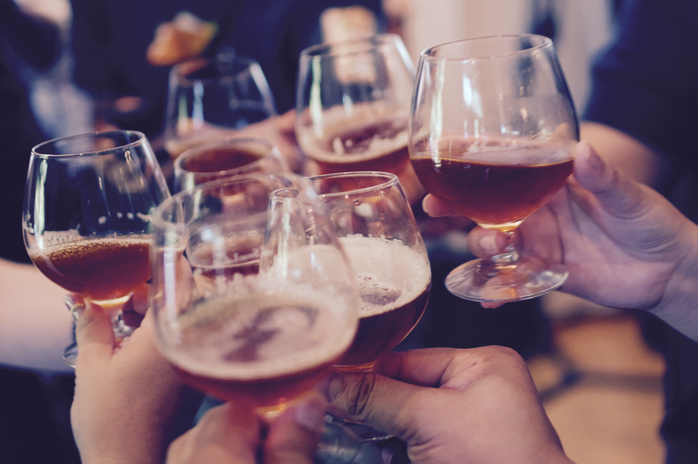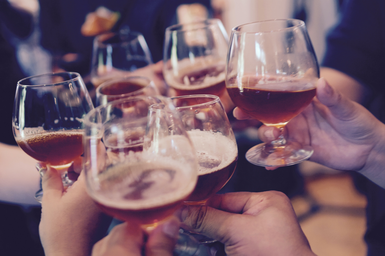Today, it’s not unusual for university students to enjoy a bit of the ‘bev’. However, what most people don’t see is the downsides to the drinking culture that is all too popular at universities. Because most students begin Uni at 18 when they have only just reached the legal drinking age and may have not figured out their limits yet – because some don’t steal a drink from their house and go up to the woods to drink (it’s a canon event I fear), it is common for students to drink excessively.
However, more students are now reporting that they do not drink alcohol at all. A study which took place at UWE Bristol in 2023, shows that 19% of students who choose not to drink, their reason for not drinking was that they didn’t like the effect it had on them. And when asked about whether they thought drinking was a part of ‘uni culture’ 81% of them agreed.1
This issue was raised to me by one of my friends who has decided to do a year sober and inspired me to investigate this issue. In October, I sat down with him to garner his reasons for wanting to do a year sober, in the hope that people who are also struggling with their relationship with alcohol know that they are not alone and that there are steps they can take to improve their lifestyles.
What made you want to do a year sober?
- Realisation of a negative relationship with alcohol
- ‘On nights out I would always be the one who got the most drunk and I would never know when to stop.’
- ‘Club culture’ – feeling you can’t not drink in the club because everyone else is and you feel pressured to as well
- Had no time to properly reflect on the effects it was having
- Blacking out and not having much memory of events
- Typical hangovers would last 2-3 days instead of 1-2 which is usually the norm
- Would always be chasing the next night out
- After getting diagnosed with ADHD and getting onto medication, it’s dangerous to drink when being on such a strong medication, so the medication helped get off the drink
- Drink enhances negative emotions – if you’re already feeling down before drinking, the alcohol just makes it worse
- Wanted to experience genuine happiness without having to rely on alcohol
- Removing alcohol improved mental health
- Had previously completed 53 days sober- which wasn’t planned and started to feel the benefits near the end, ended up drinking again, but this time the plan for staying sober is more thought out.
How many days in are you and how are you finding it?
- 43 days in
- Feeling much healthier, mentally, and physically
- Been more consistent with the gym
- Getting used to socialising on nights out
- Still adjusting to being sober
- Confidence is changing for the better the more days pass
- Not as much of a people pleaser, has boundaries now and knows when to say no
- Having a strong support system – Feeling comfortable opening about feeling socially awkward and anxious to friends
- Has really enjoyed clubbing sober
- Has never experienced the type of confidence he has now
Do you think that alcohol has affected your mental health?
- Had struggles with mental health before drinking – alcohol was used to mask emotions that he didn’t want to address
- Felt euphoric at certain times and free and detached from his emotions when drinking as there was a never-ending loop of a night out, hangover and then looking to see when the next night out was.
- Before diagnosis, struggled with ADHD symptoms
- There was a lack of motivation and just not being able to get anything done
Can your friends now see the difference on a night out with you from how you were previously?
- ‘Yes, not being the drunkest person in the room anymore is a change but my friends have been so supportive of my decision.’
- ‘I’m having more present and more meaningful conversations and making sure I’, comfortable in social settings.’
What is your constant motivation for committing to a year sober?
- Has already started seeing the benefits in mental well-being and physical health- no hangovers, being more productive at uni, a nicer person to be around, no ‘hangxiety’ (waking up hungover, feeling anxious about what you did the night before), ADHD meds are more effective as there is no alcohol in the system, is more present in conversations and has new things to look forward to and feels like he has more of a purpose.
- ‘Friends and family telling me they are proud of me’.
- ‘I realised that I didn’t like the person I was when drinking and it brought out the worst in me, I felt like drunk me and sober me were two completely different people.’
Is there anything online or that you’ve read that has helped you commit to staying sober?
- ‘How to Quit Alcohol in 50 Days’ – Simon Chapple – The book asked him reasons why he wanted to stop drinking
- Was able to write 15 reasons down quickly why he wanted to stop drinking alcohol
- Dr Alex from Tik Tok – an influencer who has ADHD and issues with alcohol: ‘Seeing the difference it made to his life was inspiring and watching videos with people who relate to his issues’
- Tik Tok creators posting how long they’ve been sober and the positive impact it had on them – ‘if they can do it so can I’.
What advice would you give to those wanting to try a year sober?
- ‘Ese your way into it if you can. Do your research and understand why you want to be sober and there’s nothing to lose in going sober. Try it for a short period of time and see how you feel. But don’t put too much pressure on yourself to do a year.’
- ‘Be open and honest to your friends on why you want to stop drinking. Be honest with them on nights out. Do what is best for you.’


